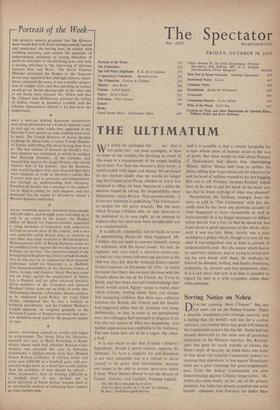THE ULTIMATUM
WE make no apologies for . . . no : that is not quite fair : we must apologise, at least to some of our readers, for devoting so much of this issue to a reassessment of the events leading up to Suez. For Suez has become a dirty word : a word loaded with anger and shame. We promised in our election leader that we would no longer nag the Conservative Party, whether or not it was returned to office, on Suez, because in a sense the electors would be taking the responsibility upon themselves—upon Britain. That promise holds: it is not our intention in publishing 'The Ultimatum' to reopen the old party wounds. But the story ' which Erskine Childers tells, we feel, deserves to be published in its own right; as an attempt to explain what has until now been inexplicable; not as a condemnation.
It is difficult, admittedly, not to think in terms of apportioning blame for what happened. Mr. Childers did not need to concern himself, except by inference, with the moral issues: his task, he • explains, was very much a detective endeavour, to find out why events followed one another in the odd way they did. But Sir Anthony Eden's speech in the Commons on December 20, 1956—in which he stated that there was no joint decision with the French about the use of the French Air Force in Israel, and that there was not foreknowledge that Israel would attack Egypt—poses a moral issue which nobody, writing about Suez, can escape. The mounting evidence that there was collusion between the British, the French and the Israelis had suggested either that Sir Anthony was lying, deliberately; or that, in some as yet unexplained way, his colleagues had managed to disguise from him the real nature of what was happening. And neither supposition was creditable to Sir Anthony. The one made •him out to be a rogue; the other, a fool: It is too much to say that Erskine Childers's hypothesis, should it prove coriect, redeems Sir Anthony. To have a capacity for self-aeception • is not very estimable; nor is a refusal to allow oneself to be given vital information, because one hopes to be able to protest ignorance about it later. When Menas offered to cut the throats of Caesar, Antony, and Lepidus, Pompey replied : Ah, this thou shouldst have done,
And not have spoke on 't. In me 'tis villainy; In thee 't had been good service
and it is possible to feel a certain sympathy for a man whose sense of honour stood in the way of profit. But what would we feel about Pompey if Shakespeare had shown him interrupting Menas, before Menas had time to outline his plans; telling him to go ahead and do whatever he and his band of ruffians wanted to do; but begging him not to tell Pompey, because Pompey hoped later to be able to put his hand on his heart and say that he knew nothing of what was planned?
Nevertheless Sir Anthony emerges from the story as told in 'The Ultimatum' with less dis- credit than he has from any previous account of what happened at Suez—favourable as well as unfavourable: It is no longer necessary to believe either that he was a liar, or that he stood (or was kept) aloof in giant ignorance of the whole affair until it was too late. Here, clearly, was a man wedded to a policy which, though it is now all too clear it was misguided, was at least in pursuit of understandable ends. But the means which had to be used were dubious; and in trying to avoid soil- ing his own hands with them, Sir Anthony let himself be deluded, bullied, and finally destroyed, politically, by cleverer and less scrupulous allies. It is a sad story; but now it at least is possible to • regard his part in it with sympathy rather than with contempt.










































 Previous page
Previous page